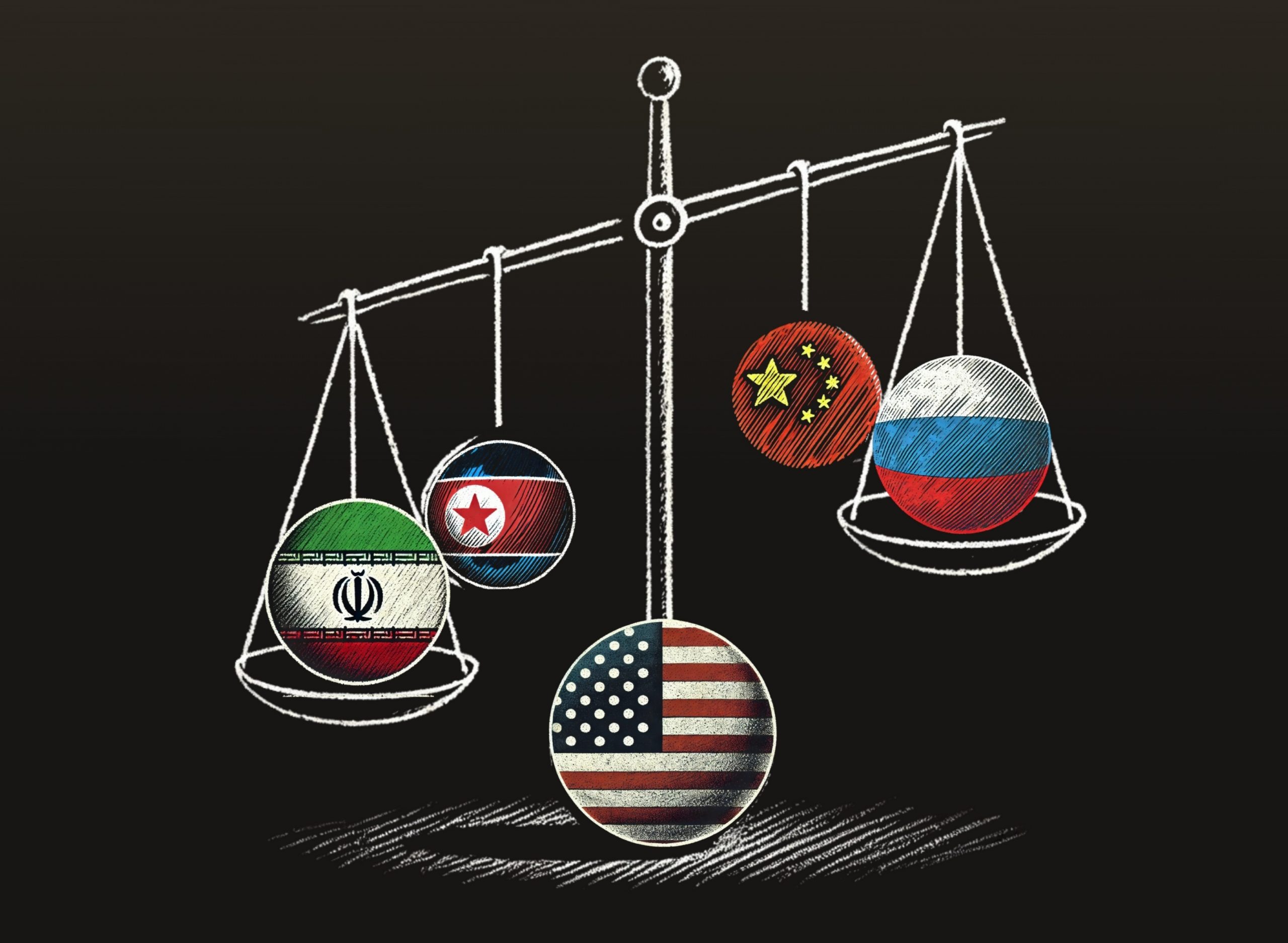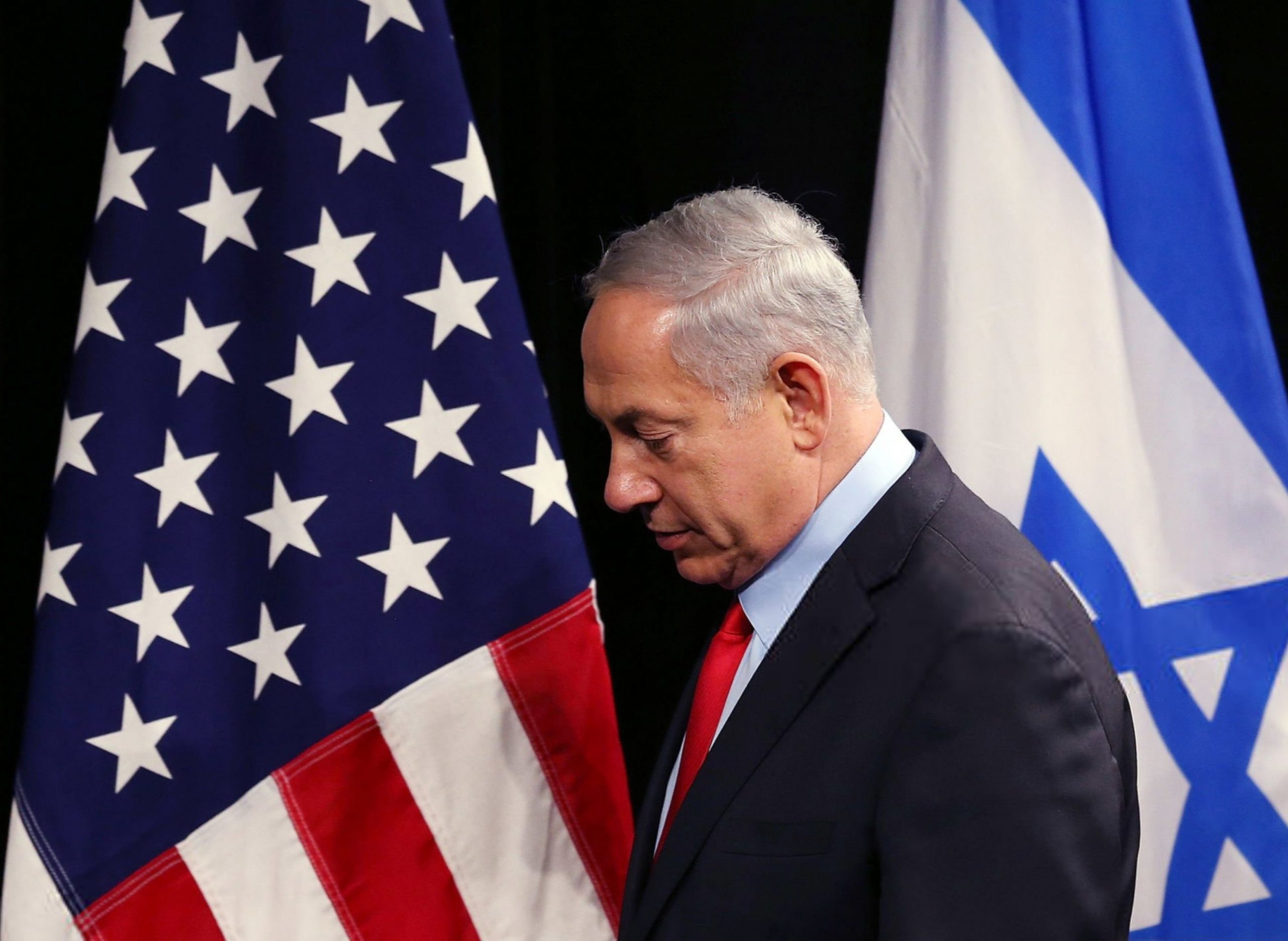

Israeli prime minister Benjamin Netanyahu prepares to speak at the Computer History Museum on March 5, 2014 in Mountain View, California. Israeli Prime Minister Benjamin Netanyahu joined California Gov. Jerry Brown to sign a historic agreement that expands California's partnership with Israel on economic development, research and trade. (Photo by Justin Sullivan/Getty Images)
The U.S.-Israel alliance has long stood as a key pillar of U.S. foreign policy toward the Middle East. Leaders across the political spectrum have expressed an unwavering commitment to this “special relationship” rooted in Cold War geopolitics and mutual security interests. Democrats and Republicans alike have traditionally embraced Israel as a crucial ally bound closely to the U.S. by shared values—a liberal democracy amid authoritarianism in the region.
While the relationship has rested on bipartisan foundations for decades, recent years have witnessed a steady erosion of this consensus. At the heart of growing tensions is Israeli Prime Minister Benjamin Netanyahu. His political persona and governing philosophy—marked by ethno-religious nationalism, security maximalism, and populist defiance—have collided with the American Left’s normative emphasis on human rights, liberal internationalism, and social justice. Progressive forces in U.S. politics, including segments of the Democratic Party, increasingly challenge the moral and strategic underpinnings of his policies.
Netanyahu has developed an image that is anathema to progressive politics. Many in the U.S.—particularly younger and more liberal audiences—no longer view Israel under his rule as a partner in democracy but as a regime that is pursuing expansionism and racial hierarchy. As the American Left mobilizes support, its rift with Israel’s longest-serving prime minister widens into what may become a long-term strategic divergence that is indicative of a broader structural realignment.
Netanyahu’s American Playbook
Few world leaders have cultivated influence in the U.S. more deftly than Netanyahu. Educated at MIT and Harvard University, he gained a deep familiarity with U.S. politics early in his career. Then adopting the Americanized name Ben Nitay, he spent formative years in the country forging bonds that served his own pursuit of power decades later. He built a network that turned prominent pro-Israel supporters in the Republican establishment into lifelong friends. After graduating from MIT, Netanyahu worked as a consultant at Boston Consulting Group from 1976 to 1978. During this time, he nurtured a relationship with then-colleague—and future governor of Massachusetts and Republican Party presidential candidate—Mitt Romney.
Netanyahu also has a long history of friendship with the Kushners who share personal and religious ties to Israel. In 2007, he considered billionaire real estate mogul Charles Kushner a top potential donor for political campaigns. The Kushners’ family foundation has subsidized Netanyahu’s expansionist agenda, donating tens of thousands of dollars to Israeli settlements, according to IRS filings from 2010 to 2014. Netanyahu has even stayed at their home in New Jersey—on one reported occasion, he slept in the bedroom of Charles’ son and President Trump’s son-in-law and former senior advisor, Jared Kushner.
Netanyahu’s American-made background has allowed him to maintain relations with conservatives that empower him to brazenly confront Democratic leadership. This was especially the case with President Barack Obama as he took a new approach to U.S. foreign policy toward the Middle East. The Obama administration sought to engage with Israel in a way its predecessor had not done—talking tough, publicly and privately; however, it hindered efforts aimed at promoting regional stability and security.
holds an M.A. in Security Studies with a concentration in International Security and Terrorism and Substate Violence from Georgetown University’s School of Foreign Service.
The U.S.-Israel alliance has long stood as a key pillar of U.S. foreign policy toward the Middle East. Leaders across the political spectrum have expressed an unwavering commitment to this “special relationship” rooted in Cold War geopolitics and mutual security interests. Democrats and Republicans alike have traditionally embraced Israel as a crucial ally bound closely to the U.S. by shared values—a liberal democracy amid authoritarianism in the region.
While the relationship has rested on bipartisan foundations for decades, recent years have witnessed a steady erosion of this consensus. At the heart of growing tensions is Israeli Prime Minister Benjamin Netanyahu. His political persona and governing philosophy—marked by ethno-religious nationalism, security maximalism, and populist defiance—have collided with the American Left’s normative emphasis on human rights, liberal internationalism, and social justice. Progressive forces in U.S. politics, including segments of the Democratic Party, increasingly challenge the moral and strategic underpinnings of his policies.
Netanyahu has developed an image that is anathema to progressive politics. Many in the U.S.—particularly younger and more liberal audiences—no longer view Israel under his rule as a partner in democracy but as a regime that is pursuing expansionism and racial hierarchy. As the American Left mobilizes support, its rift with Israel’s longest-serving prime minister widens into what may become a long-term strategic divergence that is indicative of a broader structural realignment.
Netanyahu’s American Playbook
Few world leaders have cultivated influence in the U.S. more deftly than Netanyahu. Educated at MIT and Harvard University, he gained a deep familiarity with U.S. politics early in his career. Then adopting the Americanized name Ben Nitay, he spent formative years in the country forging bonds that served his own pursuit of power decades later. He built a network that turned prominent pro-Israel supporters in the Republican establishment into lifelong friends. After graduating from MIT, Netanyahu worked as a consultant at Boston Consulting Group from 1976 to 1978. During this time, he nurtured a relationship with then-colleague—and future governor of Massachusetts and Republican Party presidential candidate—Mitt Romney.
Netanyahu also has a long history of friendship with the Kushners who share personal and religious ties to Israel. In 2007, he considered billionaire real estate mogul Charles Kushner a top potential donor for political campaigns. The Kushners’ family foundation has subsidized Netanyahu’s expansionist agenda, donating tens of thousands of dollars to Israeli settlements, according to IRS filings from 2010 to 2014. Netanyahu has even stayed at their home in New Jersey—on one reported occasion, he slept in the bedroom of Charles’ son and President Trump’s son-in-law and former senior advisor, Jared Kushner.
Netanyahu’s American-made background has allowed him to maintain relations with conservatives that empower him to brazenly confront Democratic leadership. This was especially the case with President Barack Obama as he took a new approach to U.S. foreign policy toward the Middle East. The Obama administration sought to engage with Israel in a way its predecessor had not done—talking tough, publicly and privately; however, it hindered efforts aimed at promoting regional stability and security.
holds an M.A. in Security Studies with a concentration in International Security and Terrorism and Substate Violence from Georgetown University’s School of Foreign Service.
The Obama-Netanyahu relationship was controversial from the start. In his first term, Obama travelled to over 30 countries, including Egypt, Türkiye, and Saudi Arabia. Yet he did not visit Israel over concern about collapsing U.S.-led peace efforts, saying he wanted to go when “we are actually moving something forward.” Netanyahu’s supporters in the Republican Party slammed Obama for not conveying an unconditional commitment to support Israel. Conservatives added fuel to the Obama administration’s clash with Netanyahu, arguing its policy emboldened adversaries and put “daylight” between the U.S. and its closest ally in the region.
Hostilities escalated into dramatic foreign policy confrontations during Obama’s second term. In 2015, Netanyahu accepted Republicans’ invitation to deliver a speech on Iran before Congress without White House coordination, addressing his vehement opposition to the emerging nuclear deal brokered by the Obama administration. In 2016, the U.S.’ abstention from voting on a U.N. Security Council resolution critical of Israel—an unusual decision—further strained an already tense relationship. Condemning settlements in the occupied Palestinian Territory, including East Jerusalem, the resolution’s approval defied extraordinary pressure from Netanyahu and then-president-elect Trump. The Obama-era rupture was a watershed moment in the partisanization of U.S.-Israel relations.
Aligning himself with Republicans and openly resisting a sitting Democratic president, Netanyahu made a calculated bet: the future of Israel’s U.S. support base hinges on conservatives. With a record high partisan gap in Americans’ ratings of Israel today, largely attributable to polarization over President Trump, his gamble paid off—83 percent of Republicans have favorable opinions of Israel compared to 33 percent of Democrats, according to a Gallup poll.
Netanyahu’s media strategy remains central to his American playbook. He has demonstrated fluency in the idioms of Trump-era U.S. political culture. He is skilled in the art of televised persuasion, making himself a familiar face and an eloquent defender of Israel in the U.S. media. Netanyahu’s rise as a “star” of American television news offers him a platform to reach right-wing supporters in the U.S.
Netanyahu is adept at crafting narratives that appeal to conservatives and reposition Israel as a partisan cause in the U.S. He frames Israel as on the frontlines of defense against radical Islam—the “one proud pro-American democracy combating Iran and its terrorist proxies in the Middle East.” He makes historical comparisons between the U.S. and Israel, such as equating the Hamas-led attack on October 7, 2023, to Pearl Harbor and 9/11. Netanyahu essentially portrays Israeli military action and occupation as defending Western civilization and emblematic of Western resilience. Yet this rhetoric rings hollow for progressive audiences more attuned to human rights abuses and power asymmetries.
Losing the Left
The American Left’s evolving political conscience has recast how it views Israel, especially under Netanyahu’s leadership. Frameworks of intersectionality, anti-colonialism, and social justice increasingly shaped the progressive worldview. This new moral lens places Israel’s treatment of Palestinians within a broader critique of systemic oppression.
The Obama-Netanyahu relationship was controversial from the start. In his first term, Obama travelled to over 30 countries, including Egypt, Türkiye, and Saudi Arabia. Yet he did not visit Israel over concern about collapsing U.S.-led peace efforts, saying he wanted to go when “we are actually moving something forward.” Netanyahu’s supporters in the Republican Party slammed Obama for not conveying an unconditional commitment to support Israel. Conservatives added fuel to the Obama administration’s clash with Netanyahu, arguing its policy emboldened adversaries and put “daylight” between the U.S. and its closest ally in the region.
Hostilities escalated into dramatic foreign policy confrontations during Obama’s second term. In 2015, Netanyahu accepted Republicans’ invitation to deliver a speech on Iran before Congress without White House coordination, addressing his vehement opposition to the emerging nuclear deal brokered by the Obama administration. In 2016, the U.S.’ abstention from voting on a U.N. Security Council resolution critical of Israel—an unusual decision—further strained an already tense relationship. Condemning settlements in the occupied Palestinian Territory, including East Jerusalem, the resolution’s approval defied extraordinary pressure from Netanyahu and then-president-elect Trump. The Obama-era rupture was a watershed moment in the partisanization of U.S.-Israel relations.
Aligning himself with Republicans and openly resisting a sitting Democratic president, Netanyahu made a calculated bet: the future of Israel’s U.S. support base hinges on conservatives. With a record high partisan gap in Americans’ ratings of Israel today, largely attributable to polarization over President Trump, his gamble paid off—83 percent of Republicans have favorable opinions of Israel compared to 33 percent of Democrats, according to a Gallup poll.
Netanyahu’s media strategy remains central to his American playbook. He has demonstrated fluency in the idioms of Trump-era U.S. political culture. He is skilled in the art of televised persuasion, making himself a familiar face and an eloquent defender of Israel in the U.S. media. Netanyahu’s rise as a “star” of American television news offers him a platform to reach right-wing supporters in the U.S.
Netanyahu is adept at crafting narratives that appeal to conservatives and reposition Israel as a partisan cause in the U.S. He frames Israel as on the frontlines of defense against radical Islam—the “one proud pro-American democracy combating Iran and its terrorist proxies in the Middle East.” He makes historical comparisons between the U.S. and Israel, such as equating the Hamas-led attack on October 7, 2023, to Pearl Harbor and 9/11. Netanyahu essentially portrays Israeli military action and occupation as defending Western civilization and emblematic of Western resilience. Yet this rhetoric rings hollow for progressive audiences more attuned to human rights abuses and power asymmetries.
Losing the Left
The American Left’s evolving political conscience has recast how it views Israel, especially under Netanyahu’s leadership. Frameworks of intersectionality, anti-colonialism, and social justice increasingly shaped the progressive worldview. This new moral lens places Israel’s treatment of Palestinians within a broader critique of systemic oppression.

Key figures in U.S. politics have voiced growing opposition to Israeli policy, linking it to struggles for racial and indigenous justice. Rep. Rashida Tlaib (D-MI) denounced Israel as a U.S.-backed “apartheid regime” committing genocide against Palestinians. Sen. Bernie Sanders (I-VT) called for a cutoff of unconditional military aid to “Netanyahu’s illegal and immoral war against the Palestinian people” but later settled for measures blocking specific weapons. Rep. Ilhan Omar (D-MN) also joined over 50 colleagues in calling for conditional U.S. aid to protect civilians in Gaza.
Academic institutions and activist networks have played a pivotal role in amplifying critiques of Israel. Over 500 U.S. schools have experienced pro-Palestinian protest activity since October 7, 2023, including encampments at more than 130 of them, according to Harvard University’s Crowd Counting Consortium data. The Palestinian-led Boycott, Divestment, Sanctions (BDS) movement has gained visibility on campuses. Groups usually focused on issues such as climate change or labor are even regularly protesting against Israel.
This progressive coalition has developed into a powerful force capable of influencing mainstream political debate, causing sympathy for Israel to plummet while support for Palestinians has become a defining issue of the American Left. Sixty percent of Democrats have an unfavorable opinion of Israel, the first time a majority of any partisan group has expressed that view, according to a recent Gallup poll. Democrats are also generally more sympathetic to Palestinians than Israelis and in favor of Palestinian statehood today. In response, Netanyahu has pursued a calculated counteroffensive to shape public opinion.
Netanyahu’s American Base
Netanyahu has employed rhetorical strategies to neutralize and delegitimize opposition. He equates any criticism with antisemitism and violence, drawing on historical memory of the Holocaust and the enduring trauma of Jewish persecution. At the height of protests on U.S. campuses against the war in Gaza, Netanyahu castigated student demonstrators as “antisemitic mobs [who] have taken over leading universities,” adding that they were “reminiscent of what happened in German universities in the 1930s”—a reference to pro-Nazi paramilitary student groups.
Netanyahu also reframes any deviation of support as an existential security threat to Israel in order to justify state actions. Netanyahu has defended Israeli military operations harming civilians in Gaza, stating that “You cannot say you support Israel’s right to defend itself and then oppose Israel when it exercises that right.” In this zero-sum view, anything other than absolute support is treated as betrayal and inherently hostile, collapsing distinctions between opposing Israeli policy and denying Israel’s national sovereignty.
You cannot say you support Israel’s right to defend itself and then oppose Israel when it exercises that right.

Netanyahu’s narratives have played particularly well amongst Republicans and White evangelicals who see the Jewish state not only as a strategic ally but as a fulfillment of biblical prophecy. A Pew Research Center survey reveals that Republicans largely have confidence in Netanyahu to “do the right thing regarding world affairs,” and White evangelicals express more positive views of him than any other U.S. religious group, including Jewish Americans. Ultimately, Netanyahu has successfully shifted Israel’s image in the U.S. away from shared liberal values and toward ethno-religious nationalism and conservative identity politics.
Security by Force, Justice by Law
The chasm between Netanyahu and the American Left is both political and philosophical. Netanyahu espouses a Hobbesian worldview in which sovereignty and military strength are the bedrocks of security. A state free from external control or limitations—especially over the use of force or the threat of it—is essential to order, peace, and the safety and well-being of citizens. Morality is then fundamentally tied to what is practically necessary for survival.
The American Left, by contrast, embraces a liberal cosmopolitanism rooted in universal citizenship, human rights, and norms. Every individual—regardless of national, cultural, or religious identity—is part of a single community. This perspective promotes global governance and a rules-based order in which states are bound by obligations that extend beyond national borders. Sovereignty entails a responsibility to protect all populations, prioritizing human dignity and human well-being over state interests. If a state fails to do so, the international community has a responsibility to intervene.
This divide plays out in debate over the ongoing conflict between Israel and Hamas. To Netanyahu, the war in Gaza is a matter of survival, with security concerns justifying harsh measures. To the American Left, it is a case study in violating the principles of discrimination and proportionality. As Netanyahu appeals to realists who align with Hobbes’ perspectives on self-preservation and sovereignty, he alienates idealists who advocate for moral universalism, international cooperation, and diplomacy.
The Left Breaks Ranks
The Biden administration embodies the dilemma of attempting to maintain a fragile balance between these competing worldviews. On the one hand, President Joe Biden reaffirmed “ironclad” support for the U.S.’ principal ally in the Middle East. On the other, he faced intense pressure from progressives over his administration’s policy toward Israel.
Key points of friction include Biden’s muted approach to previous instances of escalated violence in Israel and the occupied Palestinian Territory, his tepid response to Netanyahu’s judicial overhaul threatening democratic checks and balances, and his authorization of billions of dollars in arms sales to Israel, adding to a record amount in military assistance. The Biden administration expressed disapproval of Netanyahu’s agenda at times, such as calling settlement expansion in the occupied Palestinian Territory “inconsistent” with international law. Biden also privately criticized Netanyahu for his handling of, and he threatened to condition U.S. aid to Israel on, the protection of civilians in Gaza; however, his frustrations did not translate to a major shift in policy.
This contradictory approach—rhetorical distancing combined with material continuity—was a strategically pragmatic response to division that proved counterproductive. The Biden administration was wary of alienating pro-Israel voters and donors while also aware that traditional support for Israel was politically untenable. Yet, as progressives perceived public rebukes as enabling Netanyahu’s impunity, the lack of substantial policy change fueled disunity within the Democratic base.
The Jewish-American Breakaway
Netanyahu’s political realignment has also fractured the Jewish American community. Jewish Americans have widely differing views of Israeli policy, political leadership, and the Israeli-Palestinian conflict. This divergence is largely along generational, partisan, and religious or denominational lines. Young Jewish Americans have distanced themselves from Israel since the current war in Gaza. Sixty-six point four percent of Jewish American teenagers sympathize with the Palestinian people and 36.7% sympathize with Hamas, according to a survey by the Israeli Ministry for Diaspora Affairs and Combating Antisemitism. A significant percentage—41.3%—also believe Israel is committing genocide in Gaza.
The trend continues amongst adults in the country. A Pew Research Center survey finds that younger Jewish adults express less favorable attitudes toward the Israeli people and more favorable views of the Palestinian people. It also shows that younger Jewish adults are more likely than their older counterparts to view: 1) Hamas’ reasons for fighting Israel as valid; 2) Israel’s reasons for fighting Hamas as not valid; and 3) Israel’s conduct in the war as unacceptable. Even before the Hamas-led attack and subsequent Israeli military response, there was a distinct generational gap. According to a poll of Jewish American voters by the Jewish Electorate Institute in 2021, younger Jews are more likely than older Jews to say that “Israel is an apartheid state,” “Israel’s treatment of Palestinians is similar to racism in the U.S.,” and “Israel is committing genocide against the Palestinians.”
Jewish Americans are also split by party affiliation. A Pew Research Center survey finds that Jewish Republicans are more likely than Jewish Democrats to have a positive view of Israel and less favorable views of the Palestinian people. Jewish Republicans are also more likely than Jewish Democrats to have a favorable view of Netanyahu and to say the Israeli government is making a sincere effort at a peace settlement with the Palestinians. Partisan differences are reflected in religious identity, particularly Orthodox, Reform, and secular Jewish Americans.
Orthodox Jews largely describe their political views as conservative and favor the Republican Party, according to a Pew Research Center survey. Secular and Reform Jews, by contrast, generally describe themselves as liberal and identify with or lean toward the Democratic Party. These inclinations go hand-in-hand with views of Netanyahu’s right-wing support base—Orthodox are overwhelmingly more likely than secular and Reform Jewish Americans to say that President Trump and the Republican Party are friendly toward Israel and Jews in the U.S.
As the majority of older, Orthodox, and Republican Jews remain supportive of Netanyahu and his allies, their conception of Jewish identity likely shapes their views. A Pew Research Center survey shows that these subgroups are more likely than others to: 1) feel a strong attachment to Israel; 2) describe caring about Israel as “essential” to what being Jewish means; and 3) say that they have a lot or some in common with Jews in Israel. This suggests a looming crisis of legitimacy that jeopardizes Israel’s ability to retain the emotional and political allegiance of American Jews under Netanyahu’s hardline rule.
Netanyahu’s falling out with the American Left is a consequence of his deliberate repositioning within the U.S. political landscape. This estrangement has profound implications for both U.S.-Israel relations and Israel’s alliance architecture. As Netanyahu continues to pivot toward right-wing transnationalism, he may be making short-term political gains. Yet he risks further alienating, and compromising the moral legitimacy of, traditional allies amongst liberal democracies.
These developments reveal the fragility of democratic solidarity and the emergence of a new geopolitical reality: a transition away from Cold War-style alliances to fragmented networks of transactional politics. With Netanyahu’s policies driving democratic backsliding in Israel, the final question is whether he has ensured security by any means necessary, or whether he has accelerated the decline of allies by abandoning the shared values that once held them together.
Key figures in U.S. politics have voiced growing opposition to Israeli policy, linking it to struggles for racial and indigenous justice. Rep. Rashida Tlaib (D-MI) denounced Israel as a U.S.-backed “apartheid regime” committing genocide against Palestinians. Sen. Bernie Sanders (I-VT) called for a cutoff of unconditional military aid to “Netanyahu’s illegal and immoral war against the Palestinian people” but later settled for measures blocking specific weapons. Rep. Ilhan Omar (D-MN) also joined over 50 colleagues in calling for conditional U.S. aid to protect civilians in Gaza.
Academic institutions and activist networks have played a pivotal role in amplifying critiques of Israel. Over 500 U.S. schools have experienced pro-Palestinian protest activity since October 7, 2023, including encampments at more than 130 of them, according to Harvard University’s Crowd Counting Consortium data. The Palestinian-led Boycott, Divestment, Sanctions (BDS) movement has gained visibility on campuses. Groups usually focused on issues such as climate change or labor are even regularly protesting against Israel.
This progressive coalition has developed into a powerful force capable of influencing mainstream political debate, causing sympathy for Israel to plummet while support for Palestinians has become a defining issue of the American Left. Sixty percent of Democrats have an unfavorable opinion of Israel, the first time a majority of any partisan group has expressed that view, according to a recent Gallup poll. Democrats are also generally more sympathetic to Palestinians than Israelis and in favor of Palestinian statehood today. In response, Netanyahu has pursued a calculated counteroffensive to shape public opinion.
Netanyahu’s American Base
Netanyahu has employed rhetorical strategies to neutralize and delegitimize opposition. He equates any criticism with antisemitism and violence, drawing on historical memory of the Holocaust and the enduring trauma of Jewish persecution. At the height of protests on U.S. campuses against the war in Gaza, Netanyahu castigated student demonstrators as “antisemitic mobs [who] have taken over leading universities,” adding that they were “reminiscent of what happened in German universities in the 1930s”—a reference to pro-Nazi paramilitary student groups.
Netanyahu also reframes any deviation of support as an existential security threat to Israel in order to justify state actions. Netanyahu has defended Israeli military operations harming civilians in Gaza, stating that “You cannot say you support Israel’s right to defend itself and then oppose Israel when it exercises that right.” In this zero-sum view, anything other than absolute support is treated as betrayal and inherently hostile, collapsing distinctions between opposing Israeli policy and denying Israel’s national sovereignty.
Netanyahu’s narratives have played particularly well amongst Republicans and White evangelicals who see the Jewish state not only as a strategic ally but as a fulfillment of biblical prophecy. A Pew Research
Center survey reveals that Republicans largely have confidence in Netanyahu to “do the right thing regarding world affairs,” and White evangelicals express more positive views of him than any other U.S. religious group, including Jewish Americans. Ultimately, Netanyahu has successfully shifted Israel’s image in the U.S. away from shared liberal values and toward ethno-religious nationalism and conservative identity politics.
Security by Force, Justice by Law
The chasm between Netanyahu and the American Left is both political and philosophical. Netanyahu espouses a Hobbesian worldview in which sovereignty and military strength are the bedrocks of security. A state free from external control or limitations—especially over the use of force or the threat of it—is essential to order, peace, and the safety and well-being of citizens. Morality is then fundamentally tied to what is practically necessary for survival.
The American Left, by contrast, embraces a liberal cosmopolitanism rooted in universal citizenship, human rights, and norms. Every individual—regardless of national, cultural, or religious identity—is part of a single community. This perspective promotes global governance and a rules-based order in which states are bound by obligations that extend beyond national borders. Sovereignty entails a responsibility to protect all populations, prioritizing human dignity and human well-being over state interests. If a state fails to do so, the international community has a responsibility to intervene.
This divide plays out in debate over the ongoing conflict between Israel and Hamas. To Netanyahu, the war in Gaza is a matter of survival, with security concerns justifying harsh measures. To the American Left, it is a case study in violating the principles of discrimination and proportionality. As Netanyahu appeals to realists who align with Hobbes’ perspectives on self-preservation and sovereignty, he alienates idealists who advocate for moral universalism, international cooperation, and diplomacy.
The Left Breaks Ranks
The Biden administration embodies the dilemma of attempting to maintain a fragile balance between these competing worldviews. On the one hand, President Joe Biden reaffirmed “ironclad” support for the U.S.’ principal ally in the Middle East. On the other, he faced intense pressure from progressives over his administration’s policy toward Israel.
Key points of friction include Biden’s muted approach to previous instances of escalated violence in Israel and the occupied Palestinian Territory, his tepid response to Netanyahu’s judicial overhaul threatening democratic checks and balances, and his authorization of billions of dollars in arms sales to Israel, adding to a record amount in military assistance. The Biden administration expressed disapproval of Netanyahu’s agenda at times, such as calling settlement expansion in the occupied Palestinian Territory “inconsistent” with international law. Biden also privately criticized Netanyahu for his handling of, and he threatened to condition U.S. aid to Israel on, the protection of civilians in Gaza; however, his frustrations did not translate to a major shift in policy.
This contradictory approach—rhetorical distancing combined with material continuity—was a strategically pragmatic response to division that proved counterproductive. The Biden administration was wary of alienating pro-Israel voters and donors while also aware that traditional support for Israel was politically untenable. Yet, as progressives perceived public rebukes as enabling Netanyahu’s impunity, the lack of substantial policy change fueled disunity within the Democratic base.
The Jewish-American Breakaway
Netanyahu’s political realignment has also fractured the Jewish American community. Jewish Americans have widely differing views of Israeli policy, political leadership, and the Israeli-Palestinian conflict. This divergence is largely along generational, partisan, and religious or denominational lines. Young Jewish Americans have distanced themselves from Israel since the current war in Gaza. Sixty-six point four percent of Jewish American teenagers sympathize with the Palestinian people and 36.7% sympathize with Hamas, according to a survey by the Israeli Ministry for Diaspora Affairs and Combating Antisemitism. A significant percentage—41.3%—also believe Israel is committing genocide in Gaza.
The trend continues amongst adults in the country. A Pew Research Center survey finds that younger Jewish adults express less favorable attitudes toward the Israeli people and more favorable views of the Palestinian people. It also shows that younger Jewish adults are more likely than their older counterparts to view: 1) Hamas’ reasons for fighting Israel as valid; 2) Israel’s reasons for fighting Hamas as not valid; and 3) Israel’s conduct in the war as unacceptable. Even before the Hamas-led attack and subsequent Israeli military response, there was a distinct generational gap. According to a poll of Jewish American voters by the Jewish Electorate Institute in 2021, younger Jews are more likely than older Jews to say that “Israel is an apartheid state,” “Israel’s treatment of Palestinians is similar to racism in the U.S.,” and “Israel is committing genocide against the Palestinians.”
Jewish Americans are also split by party affiliation. A Pew Research Center survey finds that Jewish Republicans are more likely than Jewish Democrats to have a positive view of Israel and less favorable views of the Palestinian people. Jewish Republicans are also more likely than Jewish Democrats to have a favorable view of Netanyahu and to say the Israeli government is making a sincere effort at a peace settlement with the Palestinians. Partisan differences are reflected in religious identity, particularly Orthodox, Reform, and secular Jewish Americans.
Orthodox Jews largely describe their political views as conservative and favor the Republican Party, according to a Pew Research Center survey. Secular and Reform Jews, by contrast, generally describe themselves as liberal and identify with or lean toward the Democratic Party. These inclinations go hand-in-hand with views of Netanyahu’s right-wing support base—Orthodox are overwhelmingly more likely than secular and Reform Jewish Americans to say that President Trump and the Republican Party are friendly toward Israel and Jews in the U.S.
As the majority of older, Orthodox, and Republican Jews remain supportive of Netanyahu and his allies, their conception of Jewish identity likely shapes their views. A Pew Research Center survey shows that these subgroups are more likely than others to: 1) feel a strong attachment to Israel; 2) describe caring about Israel as “essential” to what being Jewish means; and 3) say that they have a lot or some in common with Jews in Israel. This suggests a looming crisis of legitimacy that jeopardizes Israel’s ability to retain the emotional and political allegiance of American Jews under Netanyahu’s hardline rule.
Netanyahu’s falling out with the American Left is a consequence of his deliberate repositioning within the U.S. political landscape. This estrangement has profound implications for both U.S.-Israel relations and Israel’s alliance architecture. As Netanyahu continues to pivot toward right-wing transnationalism, he may be making short-term political gains. Yet he risks further alienating, and compromising the moral legitimacy of, traditional allies amongst liberal democracies.
These developments reveal the fragility of democratic solidarity and the emergence of a new geopolitical reality: a transition away from Cold War-style alliances to fragmented networks of transactional politics. With Netanyahu’s policies driving democratic backsliding in Israel, the final question is whether he has ensured security by any means necessary, or whether he has accelerated the decline of allies by abandoning the shared values that once held them together.
Recommended

India’s Internal Challenges to Global Leadership

The Chinese Experience That Challenges the Universality of Liberalism

China’s Post-Ideological Strategy of Power

How Warsaw and Kyiv Anchor Europe’s Defense

How the United States Became the World’s Most Dangerous Example?
